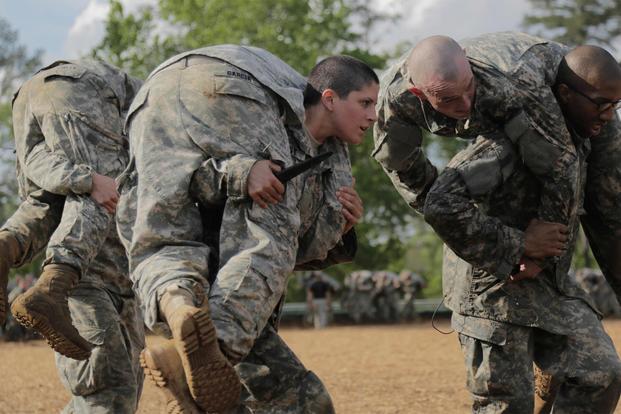The Army's first female infantry officer is urging the service not to revert to separate fitness standards for men and women.
In an essay posted online Thursday by West Point's Modern War Institute, Capt. Kristen Griest said that evaluating women based on lower fitness standards would not only hurt the effectiveness of combat arms units, it also would hurt women in the Army.
"Under a gender-based system, women in combat arms have to fight every day to dispel the notion that their presence inherently weakens these previously all-male units," Griest wrote. "Lower female standards also reinforce the belief that women cannot perform the same job as men, therefore making it difficult for women to earn the trust and confidence of their teammates."
Read Next: Army's Revamped ACFT Would Create 'Gender-Specific' Promotion Evaluation Categories
Griest's thoughts on the hotly debated issue of physical fitness standards for women in combat jobs are particularly notable due to her trailblazing status. A West Point graduate, she became one of the first three women to earn the coveted Ranger tab in 2015.
In April 2015, she was one of 19 female soldiers who were approved to attend Ranger School as part of a pilot program to determine whether the Army could safely open front-line combat jobs to women. She and another woman made history later that year as the first women to complete Ranger School and earn their tabs; a third graduated soon afterward. Griest now serves at the Army Talent Management Task Force in Washington.
The Army is considering a revision to its Army Combat Fitness Test, which is currently gender-neutral, to create gender-specific evaluation categories at promotion time.
The possible revision came up after lawmakers became concerned about the fairness of the test, and ordered the Army to conduct an independent review of it. The Service Women's Action Network last year said the new gender-neutral fitness test may not be fair to female soldiers, and that less than half of the women who took the ACFT in the third quarter of 2020 passed.
But the high failure rate, Griest argued, is not a sign that the ACFT is flawed, or that the women who initially failed it will never succeed. Instead, those failures -- including Griest's own recent failure on a practice ACFT -- can show soldiers what they most need to work on.
"It is because I have failed almost every first attempt at a military task -- from applying to West Point to graduating Ranger School -- that I know first contact with failure is not a cause for concern," she wrote.
Griest said in her essay that she has "long awaited the elimination of a gender-based fitness test."
The old Army Physical Fitness Test judged women based on standards that were far below those for men, she said, which jeopardized mission readiness and "reinforced the false notion that women are categorically incapable of performing the same job as men."
If the ACFT went back to scoring men and women differently, Griest said, combat arms units could see a drastic reduction in their performance and effectiveness. Holding soldiers serving in combat arms to differing standards could open the door to troops joining those units after only having to perform 10 push-ups in two minutes, run two miles in 21 minutes, deadlift 140 pounds three times, and perform one repetition of a leg tuck -- or, if they cannot, two minutes of a plank exercise.
"Proponents of this ACFT standard will undoubtedly claim that it is an appropriate predictor of success for combat arms soldiers," Griest wrote. "As a recent infantry company commander, I can promise you it is not."
Those low standards can have negative effects on the broader units, Griest said, derailing training exercises, combat patrols, and forcing companies to halt operations while "ill-prepared" troops are medically evacuated.
"This scenario is inconvenient and bad for morale during a training exercise," she wrote. "In combat, it could be deadly."
Creating a gender-based ACFT for combat arms will normalize the problem of soldiers who are not prepared for the physical strain of combat, Griest said, not fix it.
"It is wholly unethical to allow the standards of the nation's premiere fighting units to degrade so badly, just to accommodate the lowest-performing soldiers," she wrote.
Switching to gender-based scores and reducing the combat arms standard will also hurt the women serving there, Griest said. Holding women to lower standards reinforces the idea that they cannot perform the same job as men, which makes it harder for them to earn their teammates' trust and confidence, she added.
"While it may be difficult for a 120-pound woman to lift or drag 250 pounds, the Army cannot artificially absolve women of that responsibility; it may still exist on the battlefield," Griest wrote.
"The entire purpose of creating a gender-neutral test was to acknowledge the reality that each job has objective physical standards to which all soldiers should be held, regardless of gender," she continued. "The intent was not to ensure that women and men will have an equal likelihood of meeting those standards. Rather, it is incumbent upon women who volunteer for the combat arms profession to ensure they are fully capable and qualified for it."
-- Stephen Losey can be reached at stephen.losey@military.com. Follow him on Twitter @stephenlosey.
Related: Army's First Female Infantry Officer Assigned to Fort Benning














